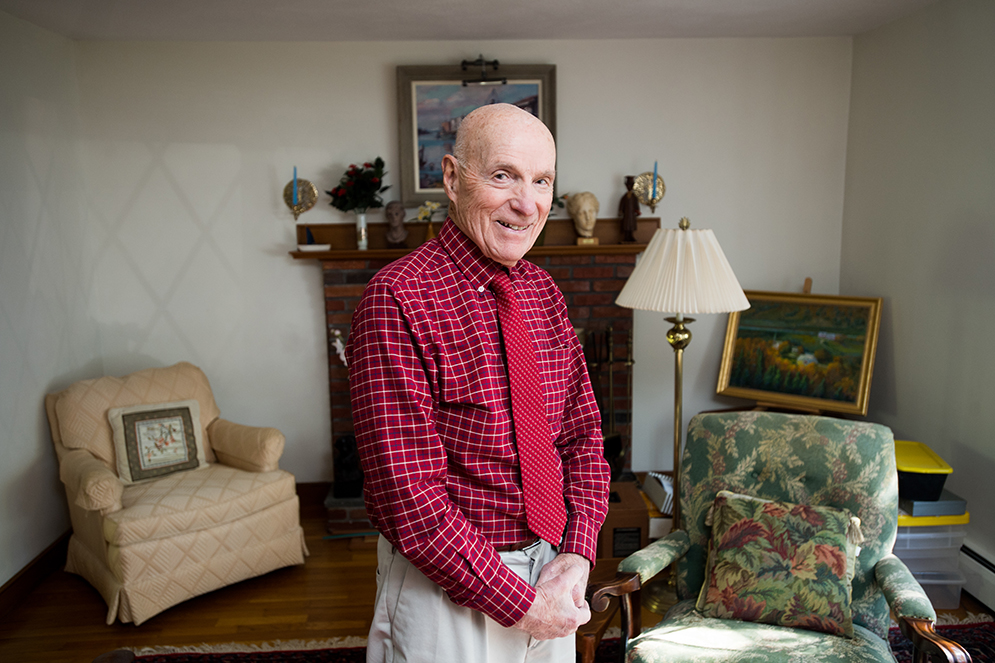Go Ahead, Test Him
Chris Gussis (Wheelock’71) has devoted his retirement to medical science

Chris Gussis, 89, has participated in more than 300 medical and health experiments in labs at BU and elsewhere, studying subjects from toothbrush efficiency to multivitamin outcomes. Photos by Cydney Scott
Chris Gussis has been poked and prodded, tested on treadmills and with memory quizzes, served fatty meals followed by blood tests. His memory, cognition, and emotional regulation have been measured and his brain waves monitored. And he went through it all for science.
Gussis (Wheelock’71) has offered himself up in at least 317 medical and health experiments in labs at BU and elsewhere, studying subjects from toothbrush efficiency (battery vs. rechargeable) to multivitamin outcomes. He has contributed to scientific knowledge of emotional regulation in adulthood, the diagnosis of Alzheimer’s through optical spectroscopy, and the effects of consuming eggs and egg substitutes on cognitive function in older adults. And that’s just, you know, lately.
“It’s what kept me going,” he says. “It’s been a lot of fun.”
A Rutgers graduate who earned a doctorate in education at BU, 89-year-old Gussis taught health science at Montclair State University in New Jersey before retiring and moving to the Boston area in the mid-1990s. He began casting about for a meaningful project to fill his days, and was intrigued by the many experiments needing volunteer subjects at the area’s universities, hospitals, and medical schools.
“This is a hotbed,” he says. “I thought, let me see what this is like. And I got hooked on it.”

He has become a regular in labs from the BU Medical Campus to Mass General Hospital to the Hebrew SeniorLife Institute for Aging Research at the Hebrew Rehabilitation Center in Roslindale, just a short walk from his house.
“You learn a lot about who you are, your plusses and minuses,” he says in his immaculate living room on a quiet side street in Jamaica Plain. “There was one study I found out I have leaky heart valves. Another study, I found out I have a good gene—the APO4 gene puts you in position to get Parkinson’s disease, and I have the APO3 gene.”
Gussis jokes about his hearing and his short-term memory, but he’s meticulous about maintaining the seven-page, single-spaced list that tracks his experimental career.
“He’s a wonderful gentleman. He really is an example of what makes our research studies work,” says Eric Steinberg, project manager for the Health Outreach Program for the Elderly (HOPE) study, conducted by the BU Alzheimer’s Disease Center. “There is a lot of hope in this field now, and that’s because of people like Mr. Gussis, who are willing to come and participate in studies.”
Gussis is part of the HOPE longitudinal research registry, which tracks people with and without memory problems. The subjects come to the School of Medicine for three hours every year for an interview and a battery of cognitive tests.
While many of the studies offer honorariums, most are modest. Money doesn’t motivate Gussis, but recognition would be rewarding. He tried for the Guinness Book of World Records—unsuccessfully, he says and laughs. “They said, ‘If we had a way of tracking it, we’d take you, because we think you’re the only one.’”

Comments & Discussion
Boston University moderates comments to facilitate an informed, substantive, civil conversation. Abusive, profane, self-promotional, misleading, incoherent or off-topic comments will be rejected. Moderators are staffed during regular business hours (EST) and can only accept comments written in English. Statistics or facts must include a citation or a link to the citation.